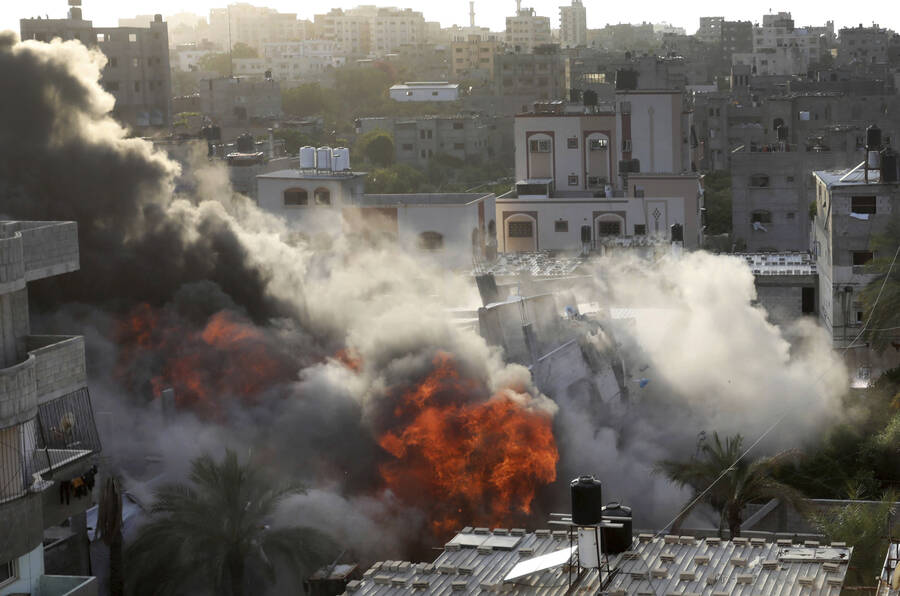The Intentional Cruelty of “Conflict Management” in Gaza
Successive Israeli governments have embraced a paradigm that all but guarantees perpetual war.

An Israeli airstrike causes an explosion upon hitting a building owned by an Islamic Jihad official, Saturday, May 13th.
(This article previously appeared in the Jewish Currents email newsletter; subscribe here!)
Last Tuesday, the IDF announced “Operation Arrow and Shield,” Israel’s latest round of airstrikes in the Gaza Strip, which targeted the militant group Palestinian Islamic Jihad (PIJ). Over the next five days, Israeli missiles killed 33 Palestinians, many of them civilians; Israel claims that 18 of those killed were PIJ operatives. PIJ responded by firing rockets that killed one Israeli woman in the city of Rehovot and one Palestinian agricultural laborer working inside Israel.
Small wars like these have become a grim routine, an almost yearly occurrence. As Israel’s brutal blockade of Gaza grinds on, Palestinian militant factions sporadically launch rockets into Israel to demonstrate their continued resistance, often following highly visible or particularly egregious violations of Palestinian rights. PIJ’s most recent campaign, for instance, came after the death of leading West Bank PIJ political figure Khader Adnan in Israeli custody on May 2nd. Israel typically responds to such rocket fire with overwhelming force, leaving many civilians dead. The latest round of fighting, which ended on Sunday with an Egyptian-mediated ceasefire, followed the usual trajectory. “Nothing basic has changed,” political scientist Menachem Klein told Jewish Currents. Klein referred to the recent conflict as a continuation of the “conflict management” paradigm embraced by successive Israeli governments.
Under this paradigm, the regular aerial bombardment of Gaza—what right-wing Israeli military strategists Efaim Inbar and Eitan Shamir infamously called “mowing the grass”—remains the Israeli government’s preferred approach to the besieged territory, especially given what it perceives as the alternatives, explained Kobi Michael, a senior researcher at the Institute for National Security Studies (INSS)—a think tank with close ties to Israel’s military and intelligence agencies. Michael told Jewish Currents that entirely eliminating the threat posed by Palestinian militant groups like PIJ would require a ground invasion of the Gaza Strip, and consequently risk a war with Hamas, the Palestinian militant group that governs the territory. A full-scale war with Hamas could not only result in heavy Israeli casualties but also require Israel’s reoccupation of Gaza. “It would force [Israel] to remain directly in Gaza and control two million people,” Michael said. Outside the precincts of the hardline settler right, there is no appetite for the Israeli toll that invading and reoccupying Gaza would demand.
Yet equally unthinkable for Israel’s defense establishment is any attempt to reach a long-term political resolution through negotiations with Hamas. According to Michael, the Israeli government fears that dealing directly with Hamas could destabilize the already weak and discredited Palestinian Authority (PA), which nominally governs civilian affairs in the occupied West Bank and is led by the Palestinian nationalist group Fatah. (In June 2007, Hamas ousted the PA from the Gaza Strip in a brief war after Fatah refused to recognize Hamas’s victory in the 2006 Palestinian legislative elections). The PA is effectively Israel’s subcontractor in the occupied West Bank, actively collaborating with Israel’s military in quashing resistance to the occupation. For this reason, many Palestinians have come to detest the PA leadership—a fact that has buoyed Palestinian support for Hamas and increased Israeli fears of a Hamas takeover of the West Bank. If Israel were to engage politically with Hamas, that would only strengthen the group’s position, something no Israeli government will accept.
Instead of a full-scale ground invasion or a long-term negotiated truce, the Israeli government has therefore opted for perpetual low-grade war. The overwhelming power imbalance between Israel and the Palestinian militant factions means that there is a relatively low cost to doing so. “[Palestinian] rockets cannot conquer Israel, that’s clear,” Klein said. And while rocket fire can force Israelis in the country’s south to put their lives on hold and even temporarily evacuate their cities and towns, the Israeli defense establishment prefers making its citizens weather such inconveniences to contemplating the alternatives. The risk of a small number of Israeli casualties is an accepted part of the paradigm. “The least worst option is to have these cycles [of fighting],” Michael said, noting that Operation Arrow and Shield was just “another movement in an endless symphony.”
The Israeli government’s approach to Gaza has drawn little public opposition within Israel. The leaders of the nominal opposition to the ruling Netanyahu coalition—Yair Lapid of the centrist Yesh Atid party and Benny Gantz of the center-right National Unity party—have advocated for maintaining the status quo in Gaza; both vocally backed Operation Arrow and Shield. The broader public is likewise supportive of the “conflict management” paradigm and the latest war, even amidst widespread protests against the current government. (On Saturday, for the first time in 19 weeks, protest leaders called off their weekly demonstrations, ostensibly due to fear of rocket fire.) As Shai Agmon, a researcher with the progressive think tank Molad, wrote in Haaretz, when it comes to Gaza, “the opposition in Israel, and not for the first time, does not exist.”
If the latest war in Gaza indicates anything new, it is perhaps that the “conflict management” paradigm has, in fact, become more entrenched—not only because of the lack of Israeli support for an alternative, but also because of a confluence of interests between Israel and Hamas that has kept Hamas from taking part in the most recent round of rocket fire. According to Haaretz Middle East affairs analyst Zvi Barel, Hamas did not join the fighting for “fear of losing the economic and political assets it has gained over the last years,” such as thousands of Israeli work permits for Gazan workers and funds for Gaza’s reconstruction following devastating wars in 2014 and 2021. Jeopardizing these economic stabilization efforts could undercut the group’s claim to be an “effective sovereign” in Gaza, Michael said.
Israel has likewise been keen to prevent Hamas—the most well-armed of the factions in Gaza—from joining the fighting. Yonatan Touval, an analyst with progressive Israeli foreign policy think tank Mitvim, said that Israel used to “[hold] Hamas responsible for any rocket fire coming out of Gaza.” But unlike previous rounds of Israeli bombing and Palestinian rocket fire, such as the May 2021 war, during the most recent Israeli airstrikes the IDF did not claim to target Hamas operatives, aiming instead at PIJ militants. Even while the Hamas leadership issued calls for unity with the PIJ, the Israeli government chose to view these as only declaratory—a reflection of Israel’s “real intention to disentangle Hamas from Islamic Jihad,” Touval said. “The hope is that Hamas stays out [of future rounds of fighting],” Touval added. With Hamas absent from the fray, bombing Gaza becomes even less costly for Israel (although Hamas may yet be drawn into a new round of conflict; the ultranationalist “March of Flags”—which prompted Hamas rocket fire in May 2021—is scheduled to go through Jerusalem’s Old City on Thursday).
With or without Hamas’s participation, however, the crushingly inhumane conditions in the besieged Palestinian territory all but guarantee that armed Palestinian resistance, in one form or another, will persist. The catastrophe of “conflict management” is not simply that it destroys the futures of millions of Palestinians in Gaza—not simply that it is deadly, primarily for Palestinians but also for Israelis—but that the end of each war simply portends the start of another. The next Israeli bombardment of Gaza is only a matter of time.
Joshua Leifer is a member of the Dissent editorial board. His essays and reporting have also appeared in The Guardian, The Nation, Jacobin, +972 Magazine, and elsewhere.

